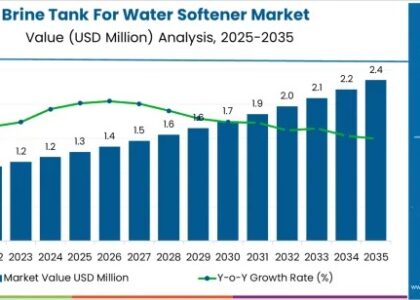Introduction
In recent years, the global movement towards sustainability and environmental consciousness has sparked a significant interest in eco-friendly alternatives across various industries. One such revolutionary development is the Plant-Based Foam Market, a game-changer in the world of packaging solutions. This article aims to provide an in-depth analysis of the Plant-Based Foam Market, exploring its composition, manufacturing process, applications, benefits, and potential environmental impact. Join us on this eco-friendly journey as we uncover the innovations and opportunities in this rapidly expanding market.
Plant-Based Foam Market: An Eco-Friendly Solution
Plant-Based Foam, also known as bio-foam or eco-foam, is a versatile material derived from renewable plant sources. It is a sustainable and biodegradable alternative to traditional petroleum-based foams, which have long been a major contributor to plastic waste and environmental pollution. Plant-Based Foam is manufactured using natural polymers, such as starch, cellulose, and proteins, making it compostable and environmentally friendly.
Witnessing a remarkable surge, the plant-based foam market is set to achieve a valuation of US$ 220.0 million in 2023 and is foreseen to soar to US$ 457.0 million by 2033, with sales experiencing substantial growth at an impressive CAGR of 7.6% throughout the forecast period.
Join the sustainable revolution and explore the limitless potential of plant-based foam in revolutionizing packaging solutions. @
https://www.futuremarketinsights.com/reports/sample/rep-gb-17229
Regional Analysis of the Plant-based Foam Market
North America Plant-based Foam Market is Anticipated to Command 35% of the Global Market Share.
The region’s strong presence can be attributed to several factors. Firstly, North America is characterized by a high level of consumer awareness and demand for sustainable and eco-friendly products. Consequently, this factor has driven the adoption of plant-based foam materials.
Europe Holds a Substantial Share of 29.7% in the Plant-based Foam Market, Playing a Significant Role in Driving the Growth and Development of the Industry.
Europe is one of the leading regions for the plant-based foam market. The market growth in this region is driven by important factors including:
- The increasing demand for eco-friendly materials.
- Stringent regulations on plastic usage.
- Growing consumer awareness about sustainable products.
Key Takeaways:
- In 2022, soy-based foam captured a 40% market share due to its renewable nature and derived from soybean oil. It offers cushioning properties, durability, and resistance to deformation, making it popular in mattresses, furniture, automotive seating, and insulation materials.
- The packaging industry holds a significant 50% share, utilizing plant-based foam in packaging applications for electronics, fragile goods, food and beverages, healthcare products, and consumer goods.
- Flexible foam dominates with a 60% market share, valued for its versatility and comfort in furniture, bedding, automotive, and packaging.
- North America commands a 35% market share, driven by consumer awareness, established industries, supportive regulations, and advanced capabilities.
- Europe holds a substantial 29.7% share, influenced by demand for eco-friendly materials, regulations, and automotive and packaging industries.
- Asia Pacific region is projected to expand by 6.9%, driven by demand for eco-friendly products, government initiatives, and increased use in packaging, automotive, and construction.
Plant-based foam provides a sustainable and environment-friendly alternative to traditional foam materials. Its advantages include reduced environmental impact, biodegradability, non-toxicity, versatility, comparable performance, consumer demand, ongoing innovations, regulatory support, and collaborative efforts toward a green future.
Customize Your Report: Tailor the Exclusive Insights to Your Plant-Based Foam Market Strategy! @ https://www.futuremarketinsights.com/customization-available/rep-gb-17229
Plant-Based Foam Market: Current Scenario and Future Outlook
The Plant-Based Foam Market has been experiencing robust growth due to the increasing demand for sustainable packaging solutions. As consumers become more environmentally conscious, industries are keen to adopt eco-friendly alternatives, boosting the market’s expansion.
According to research by Grand View Research, the global Plant-Based Foam Market is projected to reach $7.8 billion by 2028, with a compound annual growth rate (CAGR) of 6.5%. This growth is attributed to the rising popularity of eco-friendly packaging materials, favorable government regulations promoting sustainable practices, and growing awareness among consumers about the impact of single-use plastics.
By Choosing Plant-based Foam, Companies can Lead the Way in Creating a World where Sustainability and Innovation Go Hand in Hand.
Key players in the industry focus on factors like product quality, innovation, pricing, and customer service. Collaborations and partnerships are common to accelerate sustainable foam development.
Companies emphasize sustainability, investing in research and development and eco-friendly practices. The market is characterized by intense competition, innovation, and a strong focus on meeting customer demands and regulations.
- Huntsman purchased the Icynene-Lapolla in February 2020. Huntsman’s downstream footprint in spray polyurethane foam insulation has grown as a result of this acquisition. Huntsman is now the top supplier of spray foam materials used to insulate residential and commercial structures as a result of the acquisition.
- BASF SE and Liyang Shanhu Industry Auto Trim Material Co., Ltd. (“Shanhu Industry”) signed a strategic collaboration agreement in May 2019 to develop lightweight and low-emission polyurethane system products. Considering the demand in the automotive sector of China, these businesses set out to manufacture polyurethane system goods.
Gain Immediate Access to Detailed Market Insights: Purchase Now to Uncover Segment-specific Information, Identify Key Trends, Drivers, and Challenges@ https://www.futuremarketinsights.com/checkout/17229
Applications of Plant-Based Foam
Plant-Based Foam has found its way into multiple industries due to its eco-friendly nature and versatile properties. Some of the key applications include:
- Packaging Solutions: Plant-Based Foam is widely used for packaging fragile items, electronics, and food products. Its shock-absorbing and insulating properties make it an excellent choice for protecting delicate items during transportation.
- Food and Beverage Industry: In the food and beverage industry, Plant-Based Foam is used for creating disposable plates, cups, and containers. These items are not only biodegradable but also microwave and freezer-safe.
- Agricultural Sector: Plant-Based Foam is utilized in the agricultural sector as a soil additive to improve water retention and provide essential nutrients to plants.
- Automotive Applications: In the automotive industry, Plant-Based Foam is used for car seat cushions and interior components, offering comfort and sustainability.
- Medical Packaging: Due to its biocompatibility, Plant-Based Foam is used in medical packaging for the safe transportation of delicate medical equipment and supplies.
Key Segments Covered in the Plant-based Foam Market Report
By Material:
- Soy
- Corn
- Bamboo
- Sugarcane
- Algae
By Product Type:
- Rigid Foam
- Flexible Foam
- Spray Foam
- Molded Foam
- Others
By End Use:
- Packaging
- Automotive
- Construction
- Furniture
- Bedding
- Textiles,
- Electronics
By Region:
- North America
- Latin America
- Western Europe
- Eastern Europe
- Asia Pacific Excluding Japan (APEJ)
- Japan
- The Middle East & Africa (MEA)
Request Report Methodology @ https://www.futuremarketinsights.com/request-report-methodology/rep-gb-17229
About Us :
Future Market Insights, Inc. (ESOMAR certified, Stevie Award – recipient market research organization and a member of Greater New York Chamber of Commerce) provides in-depth insights into governing factors elevating the demand in the market. It discloses opportunities that will favor the market growth in various segments on the basis of Source, Application, Sales Channel, and End Use over the next 10 years.
Contact Us:
Future Market Insights Inc.
Christiana Corporate, 200 Continental Drive,
Suite 401, Newark, Delaware – 19713, USA
T: +1-845-579-5705
LinkedIn| Twitter| Blogs | YouTube
For Sales Enquiries: sales@futuremarketinsights.com






